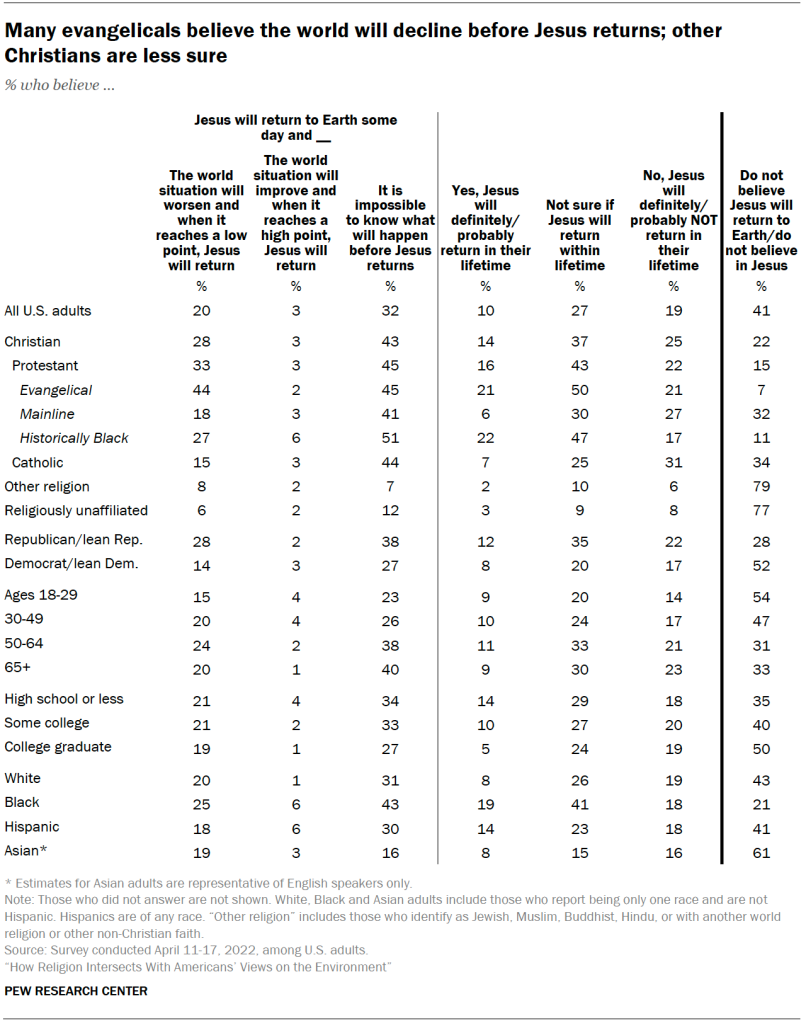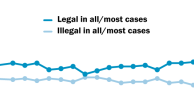Many Americans view the Earth in religious terms in at least some way. For example, seven-in-ten say the Earth is sacred, including 43% who say this is the case because God created it. Even among religiously unaffiliated Americans, two-thirds say the Earth is sacred, although they are much more likely to attribute this to the fact that all living things depend on it or that it is irreplaceable than to the view that God created it.
Six-in-ten Americans say that holy scripture contains lessons about the environment (58%), and they appear to hold nuanced views about what some of those lessons are. While two-thirds (66%) say God gave humans a duty to protect and care for the Earth, including the plants and animals, a smaller majority (54%) say God gave humans the right to use the Earth, including the plants and animals, for humanity’s benefit – and nearly half (48%) hold both these views.
When it comes to what Americans most often pray for, the environment ranks lower than some other topics. Americans who pray at least monthly are more likely to say that, in the past year, they have prayed for the healing of someone who is sick, for peace on Earth, for the poor or their family’s financial well-being than they are to say they prayed for the environment. Still, about half of all Americans who pray regularly say they have prayed for the environment in the past year.
Christians are divided on whether we are living in the “end times” – a belief that could have implications for environmental attitudes, because if the world as we know it is soon coming to an end, it may seem unnecessary to worry much about climate change or pollution. Three-quarters of U.S. Christians say they believe Jesus will return to Earth one day, but far fewer (14%) believe it will be within their lifetimes.
Most Americans say the Earth is sacred, is our only home and that God gave humans a duty to protect and care for it
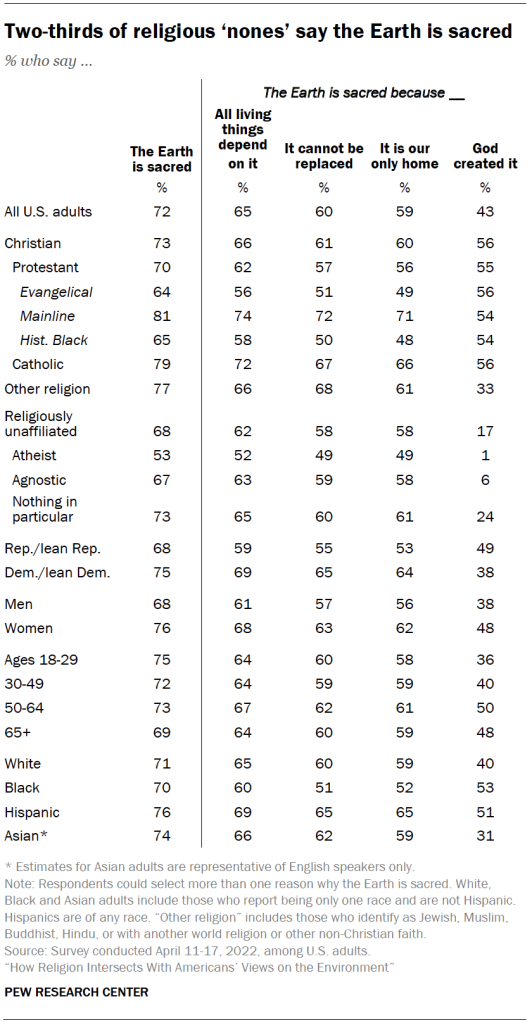
About seven-in-ten Americans (72%) say the Earth is sacred. This view is especially common among mainline Protestants (81%) and Catholics (79%), but it is by no means limited to people who identify with a religion. About two-thirds of religiously unaffiliated Americans also say the Earth is sacred, including 67% of agnostics and 53% of atheists.
Indeed, in follow-up questions, many people give reasons for viewing the Earth as sacred that are not overtly religious. Majorities of U.S. adults say that the ideas that the planet is sacred because “all living things depend on it” (65%), because “it cannot be replaced” (60%) and because “it is our only home” (59%) describe their views completely or mostly well. Fewer Americans overall (43%) say that the Earth is sacred because “God created it,” but this view is held by more than half of both Protestants (55%) and Catholics (56%).
Even though Republicans tend to be more religious on average, Democrats and independents who lean toward the Democratic Party are slightly more likely than Republicans and GOP leaners to say the Earth is sacred (75% vs. 68%). And women are slightly more likely than men to express this view (76% vs. 68%).
While Democrats are more likely than Republicans to say the Earth is sacred because all living things depend on it, it cannot be replaced, and it is our only home, Republicans are more likely than Democrats to say the Earth is sacred because God created it (49% vs. 38%). Older Americans also are more likely than younger Americans to attribute the Earth’s sacredness to God’s role in creating it.
Most Americans believe holy scripture contains lessons about the environment
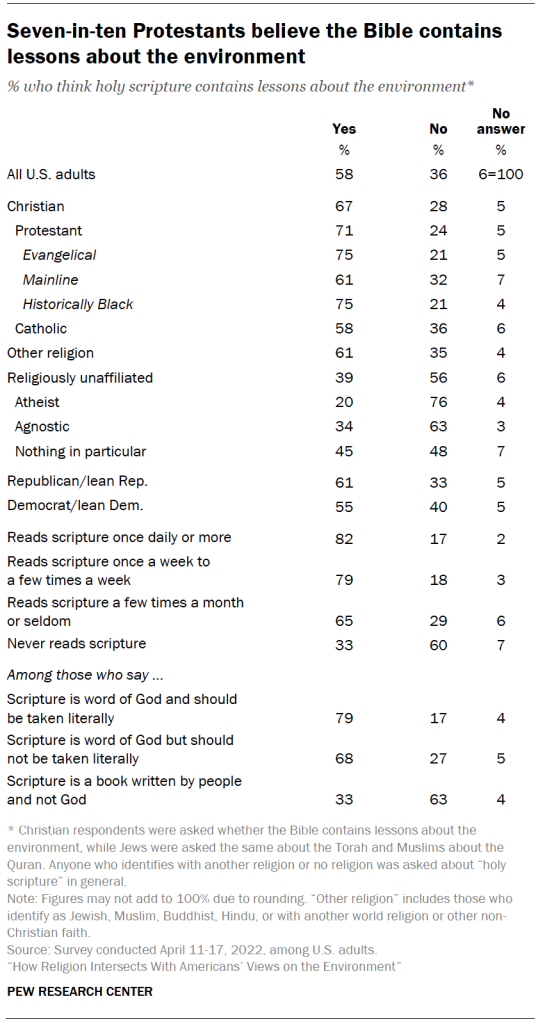
The survey asked respondents whether they think holy scripture contains lessons about the environment. For example, Christian respondents were asked whether the Bible contains these lessons, while Jews were asked the same about the Torah and Muslims were asked about the Quran. Anyone who identifies with another religion or no religion was asked about “holy scripture” in general. Overall, nearly six-in-ten U.S. adults (58%) believe the Bible or another holy book speaks to this issue, while 36% do not; the remainder decline to answer.
The view that the Bible contains lessons about the environment is shared by most adults in all of the country’s major Christian traditions, as well as by most people who identify with other (non-Christian) religions. Three-quarters of Protestants in the historically Black and evangelical traditions think the Bible has messages about the environment; smaller majorities of mainline Protestants (61%) and Catholics (58%) also say this. Religiously unaffiliated Americans are less likely to believe that holy scripture contains lessons about the environment: Majorities of atheists (76%) and agnostics (63%), along with about half of those who describe their religion as “nothing in particular,” say holy scripture does not offer any lessons about the environment.
Americans who read holy scripture more frequently are more likely to think that the Bible or another holy book contain lessons about the environment. Among adults who say they read scripture at least weekly, about eight-in-ten say these texts contain lessons about the environment. In contrast, most respondents who never read scripture say there are no messages about the environment contained within it.
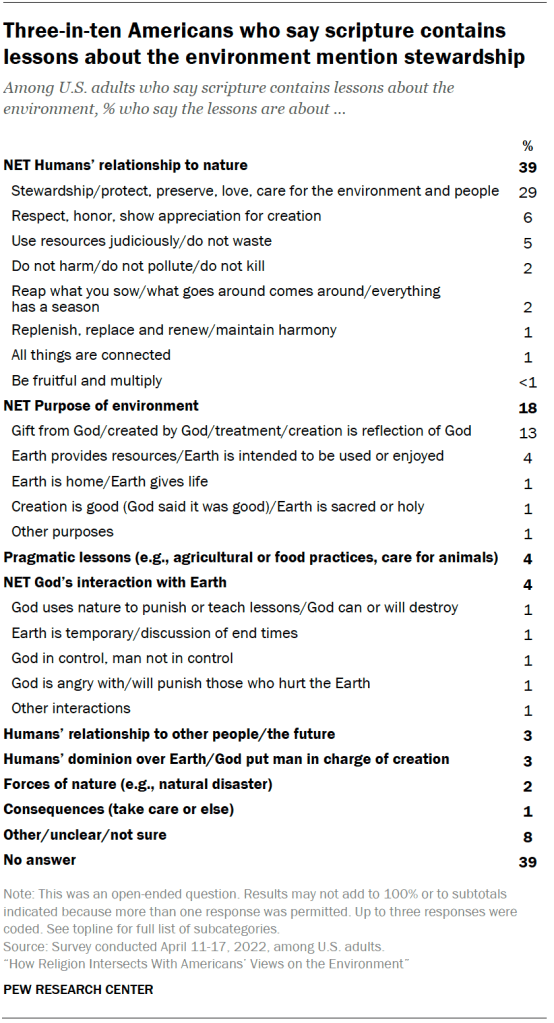
Among U.S. adults who believe the Bible is the word of God and is intended to be taken literally word for word, nearly eight-in-ten (79%) say that holy scripture contains lessons about the environment, compared with a third among those who believe holy scripture is written by people.
Those who said that holy scripture has lessons about the environment were asked to describe, in their own words, what they think those lessons are. The most common response was related to stewardship, including preserving, loving or caring for the environment and people (29%). Many also said that the lessons include the Earth being a gift from God or that creation is a gift from God (13%). Fewer mentioned pragmatic lessons such as agricultural or animal care (4%), how God interacts with the Earth (4%) or humans’ relationship to other people on the planet and the future (3%). And 3% mention dominionism or God putting man in charge of creation.
Stewardship versus dominionism: What do Americans believe?
The survey asked U.S. adults who say they believe in God or a higher power two questions aimed at measuring views about God’s intentions for humans’ role on Earth. One question offered a brief summary of the theology of stewardship, the notion that God gave humans a responsibility to protect and care for the Earth. The other question focused on the theology of dominionism, the idea that God gave humans the right to use the Earth and its resources.
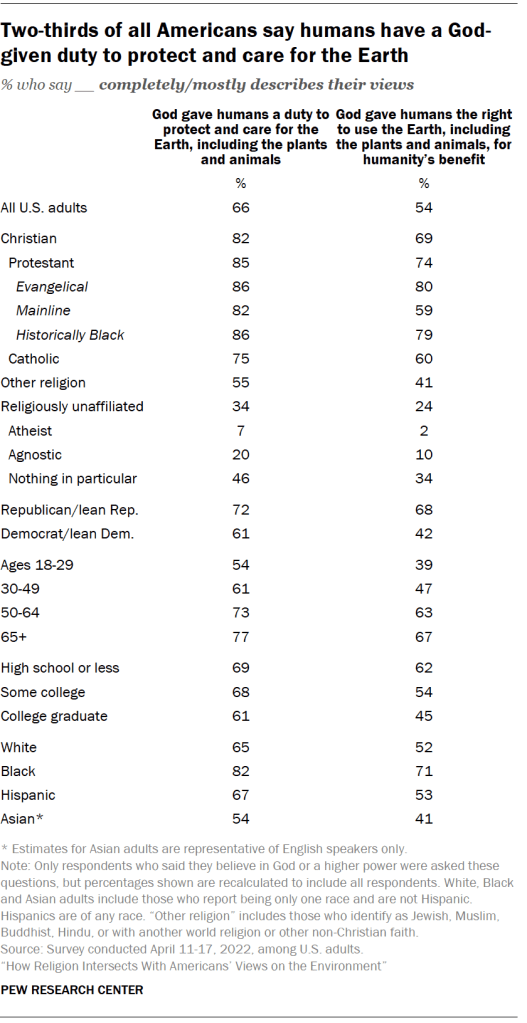
Two-thirds of all U.S. adults say the statement describing stewardship (“God gave humans a duty to protect and care for the Earth, including the plants and animals”) completely or mostly reflects their own views. A somewhat smaller majority (54%) say the same for the statement about dominionism (“God gave humans the right to use the Earth, including the plants and animals, for humanity’s benefit”). Christians are more likely than members of other (non-Christian) faiths to hold both views.
Republicans are more likely than Democrats to say God gave humans a duty to protect and care for the Earth (72% vs. 61%), as well as to say God gave humans the right to use the Earth for humanity’s benefit (68% vs. 42%). However, these differences partially reflect the fact that Democrats are less likely than Republicans to believe in God or a higher power, and thus less likely to have received these questions at all.
When considering only those who believe in God or a higher power, Republicans still are much more likely than Democrats to say God gave humans the right to use the Earth for humanity’s benefit (72% vs. 49%), but only slightly more likely to say God gave humans a duty to protect and care for the Earth (76% vs. 71%).
Older Americans, Black Americans and adults without a college degree also are especially likely to affirm the concepts of stewardship and dominionism.
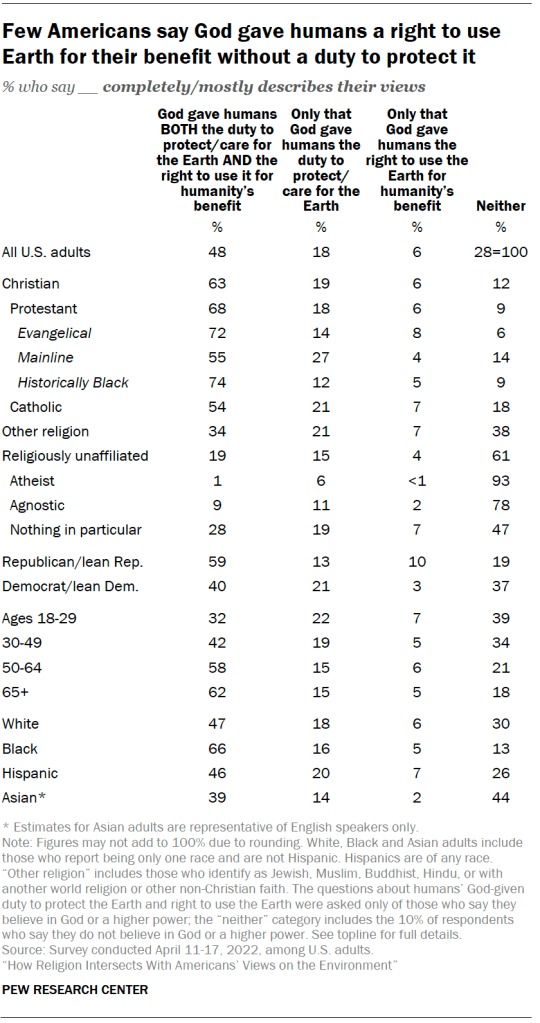
Americans broadly do not see a tension between these two concepts. Nearly half of the public (48%) affirms that both statements completely or mostly describe their views: that God intended for humans to protect and care for the Earth, while also intending for humans to use the Earth for their own benefit.
About one-in-five Americans (18%) affirm only that humans have the duty to protect and care for the Earth (but not benefit from it), while even fewer (6%) affirm only that humans have a right to use the Earth for their benefit (and not protect and care for it). The remainder – roughly three-in-ten U.S. adults (28%) – say that neither of these statements describes their views well, including the 10% of Americans who say they do not believe in God or a higher power and, hence, were not asked these theological questions.
Nearly three-quarters of members of historically Black Protestant churches (74%) and evangelical Protestants (72%) affirm both humans’ God-given duty to protect the Earth and their right to use it. While majorities of mainline Protestants (55%) and Catholics (54%) share these views, they are more likely than other Christians to affirm only that humans have the duty to protect and care for the Earth and not the right to use the planet for humanity’s benefit.
Republicans (59%) are more likely than Democrats (40%) to affirm both stewardship and dominionism, as well as to say that humans have only the right to use the Earth and not the duty to care for it (10% vs. 3%). On the other hand, about one-in-five Democrats (21%) affirm only humans’ God-given duty to protect the Earth, compared with a smaller share of Republicans (13%). A greater share of Democrats also fall into the “neither” category – rejecting both statements – which reflects lower levels of belief in God or a higher power, overall.
Many Christians say human beings are more important than other living things
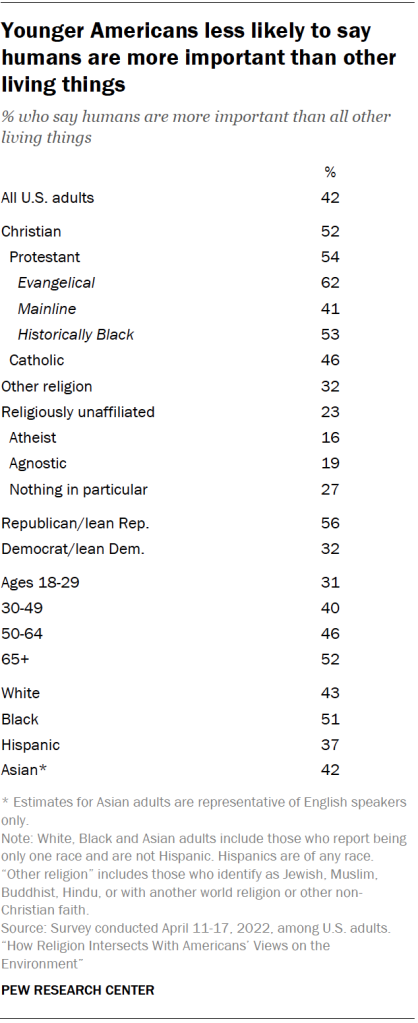
About four-in-ten Americans (42%) say humans are more important than all other living things. This opinion appears to be strongly correlated with religious affiliation: While a solid majority of evangelical Protestants (62%) say humans are more important than other living things, far fewer members of non-Christian religions (32%) and religious “nones” (23%) take this position.
A slim majority of Republicans (56%) say humans are more important than other living things, compared with about a third of Democrats (32%).
Older Americans are more likely than younger adults to say humans are more important than other living things. Black Americans also are more likely than White (non-Hispanic), Hispanic, and Asian Americans to say humans are more important.
Americans who pray regularly are less likely to pray for the environment than for other matters
The survey asked respondents who pray at least monthly to indicate if they have prayed for any of the following in the past year: healing for someone who is sick; peace on Earth; the poor; their family’s financial well-being; a political party or elected official; and the environment.
The most common prayer intention is for someone who is sick: 93% of Americans who pray at least monthly say they have prayed for this. About eight-in-ten praying adults report that they pray for peace on Earth (83%). And about three-quarters also indicate that they have prayed for the poor (76%) or for their family’s financial well-being (73%).
Among Americans who pray at least monthly, half say they have prayed for the environment in the past year (50%) – lower than all other items except praying for a political party or elected official (43%). While there is little variation across Christian traditions in the share who pray for the environment, members of other (non-Christian) faiths are somewhat more likely than Christians to do this, and Democrats who pray regularly are more likely than their Republican counterparts to say they include the environment in their prayers (59% vs. 42%).
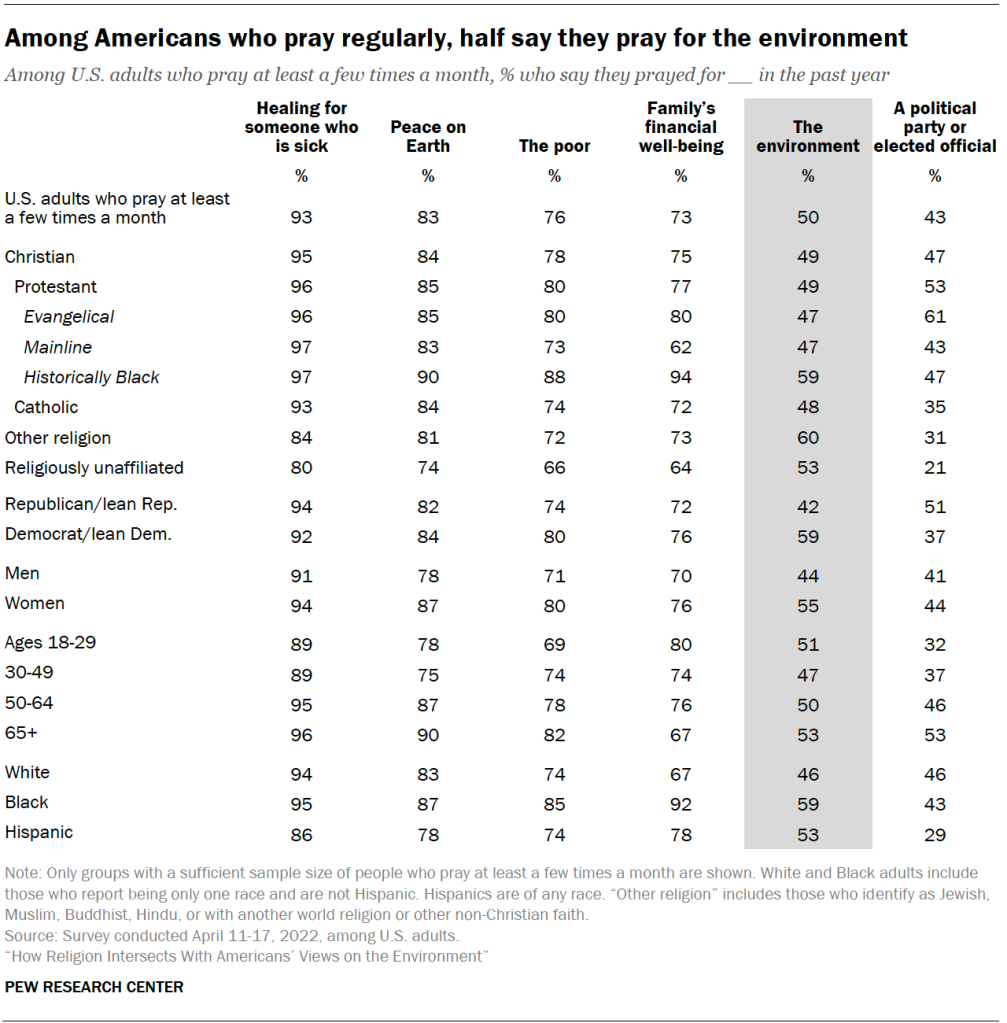
Most Protestants in evangelical and historically Black churches believe we are in the ‘end times’
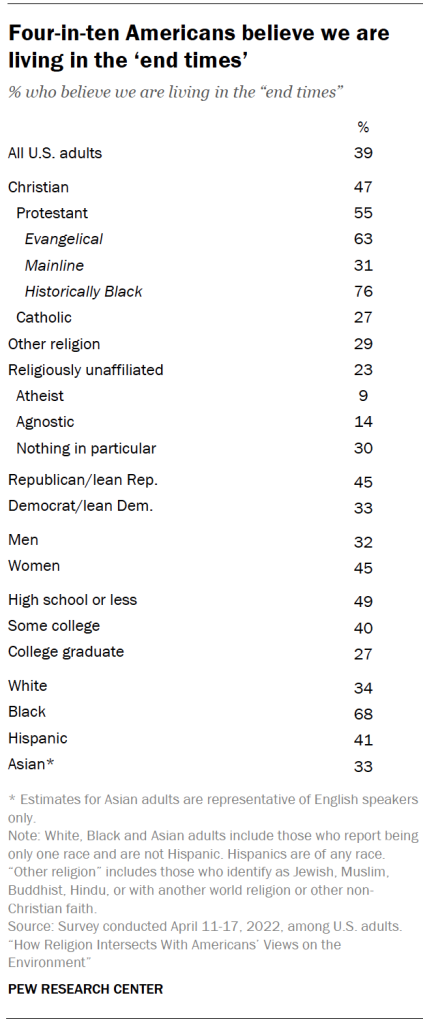
Some scholars have theorized that public attitudes toward the environment may be tied, at least in part, to beliefs about the “end times” – such as the belief that the end of the world and the arrival of a messiah (or the “second coming” of Jesus) is imminent. For example, if one believes that the world is about to end, protecting the environment for the long term may not seem as important.
About four-in-ten Americans (39%) believe we are living in the end times, including a slim majority of Protestants (55%). However, this differs substantially by specific tradition. Three-quarters of Protestants who belong to historically Black churches believe this (76%), as do 63% of evangelical Protestants. By comparison, about three-in-ten mainline Protestants (31%) and members of non-Christian religions (29%) and roughly a quarter of Catholics (27%) believe we are in living in the end times.
Belief that we are living in humanity’s final days is not limited only to Christians. For instance, among religious “nones,” 23% believe that we are living in the end times, including 9% of atheists. Among all Americans who believe we are living in the end times, 77% believe that Jesus will return, but 15% do not believe he will return and 6% do not believe in Jesus at all.
Most Black Americans (68%) believe we are living in the final days, but this is not the case for Hispanic (41%), White (34%) or Asian (33%) adults.
Most Christians believe Jesus will return to Earth, fewer say it will happen during their lifetime
In Christian theology, beliefs about the end of the world often include expectations that Jesus will return to Earth. Asked if they believe Jesus will return to Earth one day, a slim majority of Americans (55%) say “yes,” while a quarter do not believe Jesus will return. An additional 16% say they don’t believe in Jesus.
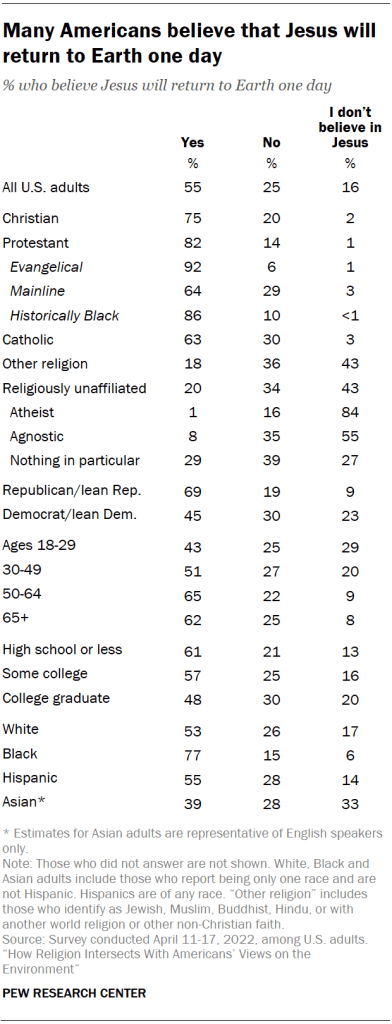
Most adults in all the major U.S. Protestant traditions, as well as most Catholics, believe that Jesus will return to Earth, although there are notable differences in the percentages who say this. For instance, 92% of evangelical Protestants hold this belief, compared with 63% of Catholics.
Republicans and older adults are more likely than Democrats and younger adults, respectively, to believe that Jesus will return to Earth.
Most Black adults (77%) say they believe Jesus will return to Earth someday, while fewer Hispanic (55%), non-Hispanic White (53%) and Asian (39%) adults believe this.
The survey also asked all respondents who believe Jesus will return how certain they are that this will happen during their lifetime, with response options ranging from “definitely yes” to “probably yes,” “not sure,” “probably no,” and “definitely no.”
One-in-ten Americans believe Jesus will return to Earth and say that it will definitely or probably happen during their lifetime. This proportion is greater among evangelical Protestants (21%) and members of the historically Black Protestant tradition (22%) and smaller among Catholics (7%) and mainline Protestants (6%).
The share of Black (19%) and Hispanic (14%) Americans who believe Jesus will return and think it is likely to happen during their lifetime is greater than the corresponding share of White (non-Hispanic) Americans (8%).
Some theological positions assert that Jesus’ return is dependent on a progressive worsening of the world’s situation (also known as “premillennialism”), while others believe that Jesus’ return will be preceded by a high point of peace and prosperity (“postmillennialism”).
One-in-five Americans (20%) hold premillennial beliefs on the topic of Jesus’ return, while a smaller share (3%) say they agree with a postmillennial position. A third of Americans say that Jesus will return but it is impossible to know the circumstances under which this will happen (32%).
Evangelicals are divided in their beliefs about the end times, with 44% subscribing to a premillennial position and a nearly identical share (45%) saying Jesus will return but that it is impossible to know the circumstances surrounding it. Fewer Protestants in the historically Black (27%) and mainline (18%) traditions, as well as Catholics (15%), hold the view that Jesus’ return will be preceded by a worsening of the world’s situation. Instead, more members of historically Black churches (51%), Catholics (44%) and mainline Protestants (41%) voice the opinion that Jesus will return but it is impossible to know what will happen beforehand.
